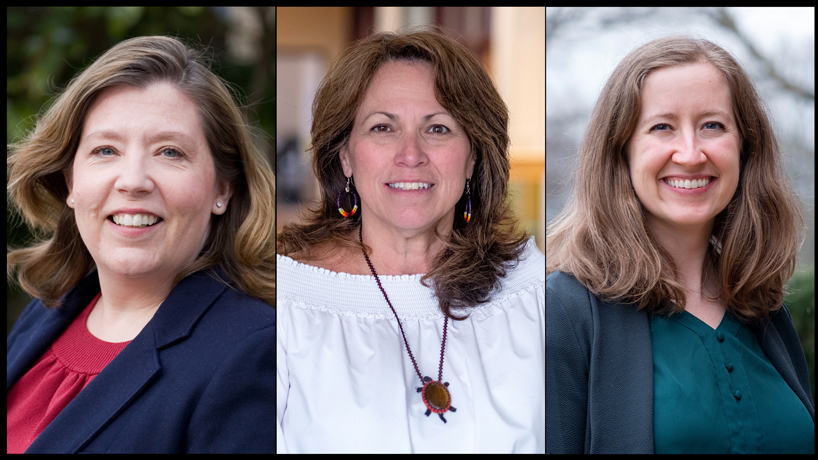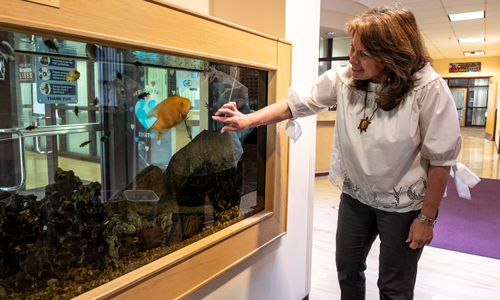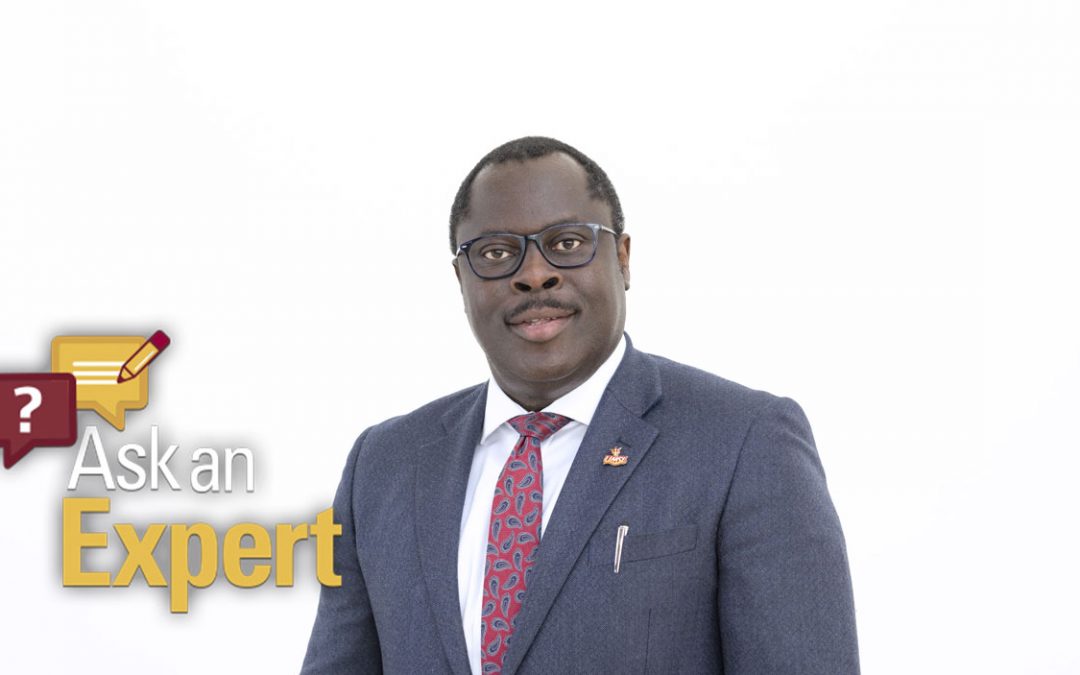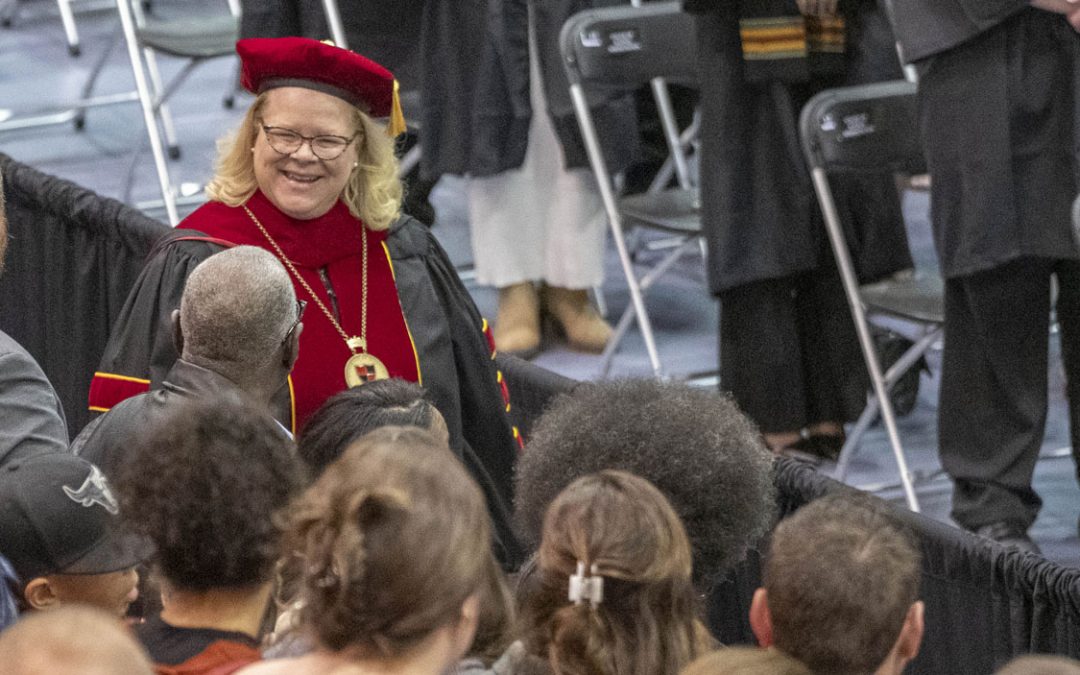
Jerry Dunn (left), Dana Klar and Dorothy Haskell, in partnership with a team of faculty and staff at the University of Alaska-Fairbanks’ Department of Social Work, have received a $500,000 grant from the Department of Justice to provide training designed to develop victim advocates in Alaska Native communities. Klar and Dunn are virtually teaching three UMSL Child Advocacy Studies courses, including child maltreatment, forensic investigation and child abuse assessment and intervention, to nine Alaska Native students. (Photos by August Jennewein)
Alaska is known for majestic vistas and wildlife – the kind of imagery that makes striking postcards and nature documentaries.
However, living in the remote towns dotting the state isn’t always so picturesque. It can be a demanding experience. Alaska Native villages in particular are often left with little to no social services infrastructure in addition to the other challenges that come with living in such isolated areas.
Leaders of the Child Advocacy Studies program and the Children’s Advocacy Services of Greater St. Louis at the University of Missouri–St. Louis want to help by bringing their expertise in trauma care to the state.
Dana Klar, assistant teaching professor of child advocacy studies; Jerry Dunn, executive director of Children’s Advocacy Services; and Dorothy Haskell, project director for the Child Advocacy Studies program, in partnership with a team of faculty and staff at the University of Alaska-Fairbanks’ Department of Social Work, have received a $500,000 grant from the Department of Justice to provide training designed to develop victim advocates in Alaska Native communities.
The grant funds the initiative for three years and has the potential to be renewed in the future. The first cohort is comprised of nine Alaska Native UAF social work students who began work on Jan. 15.
The students receive virtual instruction in three core courses of UMSL’s Child Advocacy Studies certificate, including child maltreatment, forensic investigation and child abuse assessment and intervention. They also participate in an associated mentoring program and will complete an internship.
“What struck me was that these are students who are in an undergraduate program,” Dunn said. “They have not yet completed their bachelor’s degree, and yet, they are doing a lot of primary social service work in their communities. They are often the only provider of any kind of behavioral health service in some of these communities. They are looking to us to help finish their education, and it’s an enormous honor to be able to do that.”
Haskell was the one who discovered the grant, which specified proposals for the development of victim specialists to serve American Indian or Alaska Native victims of crime.
She realized the university was in a unique position to compete for it. Not only is UMSL one of the few universities in the country that specializes in trauma-informed victim care, but Klar and Dunn are both tribal members who have worked on indigenous issues.
Klar and Dunn have previously led service learning trips to Cheyenne River Sioux Nation in South Dakota for RedCan, an annual graffiti jam. Initially, the group contacted the Oglala Lakota Community College branch located at Cheyenne River. But Klar also reached out to LaVerne Demientieff, an associate professor of social work at UAF, who she knew from her time at Washington University in St. Louis.
Demientieff was a graduate student at WUSTL and scholar at the university’s Kathryn M. Buder Center for American Indian Studies, which Klar was director of at the time. After learning about the grant, Demientieff didn’t hesitant to jump on the opportunity.
“We knew we had the training ready to go,” Klar said. “We just needed a willing partner, so it was kind of fortuitous. UAF got back to us, and they were ready to go so we went with them. Then, we were fortunately funded.”
In addition to familiarity with indigenous issues and expertise in trauma treatment and training, the UMSL team has also seen the challenges rural Missourians face accessing social services. Similar obstacles exist in Alaska, especially in Alaska Native villages.
The UAF Department of Social Work has endeavored to address those obstacles with its distance delivery rural cohort. Demientieff said the intent is to train homegrown practitioners from rural communities – like the nine students UMSL is working with.
“UAF social work focuses on workforce development in Alaska in many ways, and we are committed to supporting students in rural communities in gaining access to culturally responsive, high-quality education, so graduates can get the jobs available in their communities rather than someone from outside the community,” she said.
The cohort represents a large swath of the state – Bethel, Chignik Bay, Craig, Kodiak, Kwigillingok, Ninilchik, Shishmaref, Sitka and Yakutat – and Dunn is excited to extend UMSL’s training through UAF’s existing rural network.
“The thing to remember is it’s not only rural, but it’s remote,” she said. “To have our team trying to problem solve and brainstorm around some of the barriers with the students, it’s an honor and a privilege for us to be able to do that.”
Klar agreed and said working with UAF focused the grant application for the better.
“I think we could have met the auspices of the grant by just doing nine students in Fairbanks, but we wanted to take it to heart,” she said. “We really wanted to help get to all of the indigenous communities, and we want to spread this throughout Alaska.”
For years, Alaska has struggled with high rates of domestic violence, and indigenous communities have often been disproportionately affected. Dunn said that trauma is something indigenous communities have to address, but there needs to be a trained workforce to do so.
“One of the things that struck me as we began to talk with students in Alaska was just how much trauma there is,” she said. “Yet they have limited resources around trauma-informed care. So it’s taking what our expertise is and being able to disseminate that into a place where there is need.”
To that end, students in the cohort will essentially be fast-tracked through the CAST certificate.
Klar teaches the first two courses, and Dunn teaches the final one. Students will receive training to deal with cases involving child abuse, which might include incidences of neglect or physical, emotional or sexual abuse. Klar and Demientieff also meet with them biweekly for mentoring sessions.
The training employs a set of principles called TIERS, or trauma informed experiential reasoning skills. They help students develop core competencies that they can then use in the field.
Dunn said the skills are taught through an innovative vehicle called “problem-based learning simulations.” The students will take part in four simulations surrounding child maltreatment or child abuse, where actors play the roles of family members.
“We’ve had graduate students and postgraduate students come back for a certificate who are like, ‘This is the best training. I didn’t get this specialization in undergrad or graduate school. I’m so glad I could do this,’” Haskell said. “It’s very skills oriented.”

Dana Klar inspects Sponge Bob, a fish which was named by a child more than 20 years ago, in the waiting room of the Kathy J. Weinman Child Advocacy Center on South Campus.
Despite a distance of more than 3,000 miles and several time zones, the two universities have worked well together via Zoom. Demientieff added that the training has been a perfect complement to UAF’s program.
“This CAST certificate has some very specialized knowledge that students do not receive at UAF,” she said. “This knowledge will give them a huge boost in working with clients in every field but especially with clients in victim serving agencies. Many students already do work in the helping fields in their community. My hope is that because they are moving through this program as a cohort they will be able to link arms around this work, which is emotionally challenging, and support each other.”
The final element of the program is an internship at a victim serving agency, which will be arranged by UAF. Through the internships and existing relationships, the UMSL team hopes they will be able to spread greater awareness about victim services.
The cohort includes several non-traditional students who are already professionals in their communities. One has been an Indian Child Welfare specialist for nearly 20 years, while another serves on a tribal council. Additionally, three are fluent in indigenous languages. Ideally, this will help make inroads to communities that can be wary of government officials or outsiders.
“Their hope is to use the certificate to formalize services for children in those remote communities that they serve,” Haskell said. “I think all of our students have very big visions for how they’re going to utilize this and view it as a very high-level professional certificate to add. They’re very excited to be some of the first child advocacy studies scholars in the state of Alaska.”
The goal is to continue developing more child advocacy studies scholars in the state and elsewhere. A second nine-person cohort is planned for next year, but it will target paraprofessionals who have graduated. After that, the focus will be on extending the program for another three years.
Ultimately, Klar would like to expand and replicate it in the lower 48. The inaugural cohort is a good start, though.
“I would say give it 10 years,” Klar said. “That network is really building. I think in 10 years these scholars are going to be making some big changes in Alaska.”














